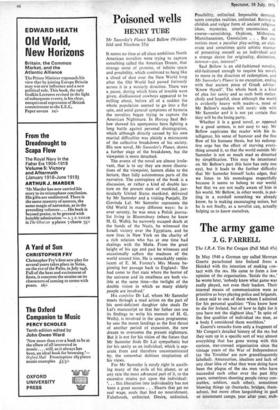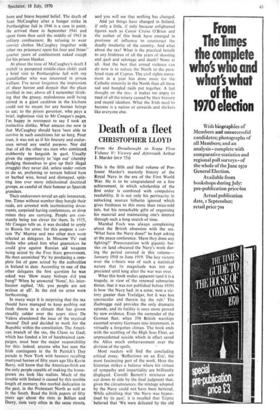The army game
J. G. FARRELL
The I.R.A. Tim Pat Coogan (Pall Mall 45s) In May 1940 a German spy called Herman Goertz parachuted into Ireland from s a Heinkel with the intention of making con- tact with the IRA. He came to form a low opinion of the organisation. -Inside the IRA,' he wrote later, 'nobody knew what game was really played, not even their leaders. Their internal means of communication were as primitive as boys playing police and brigands. I once said to one of them whom I admired for his personal qualities: "You know how to die for Ireland, but of how to fight for it you have not the slightest idea." In spite of the fine qualities of individual IRA men, as a body I considered them worthless.'
Goertz's remarks form only a fragment of Mr Coogan's detailed history of the IRA but they sum up in a specific sort of way almost everything that has gone wrong with this curious, star-crossed organisation since the vintage years of the War of Independence (as 'the Troubles' are now grandiloquently labelled). Amateurism, idealism and lack of any clear idea of what they were doing have been the plague of the IRA men who have succeeded each other over the past fifty years, sometimes shooting people (stray con- _stables, soldiers, each other), sometimes blowing things up (barracks, bridges, them- selves), but more often languishing in gaol or internment camps, year after year, stub- born and brave beyond belief. The death of Sean McCaughey after a hunger strike in Portlaoighise Jail in 1946 is a case in point. He arrived there in September 1941 and spent from then until the middle of 1943 in solitary confinement. By refusing to wear convict clothes McCaughey (together with other IRA prisoners) spent his four and three- quarter years of confinement naked except for his prison blanket.
At about the time of McCaughey's death I myself (a pampered middle-class child) paid a brief visit to Portlaoighise Jail with my grandfather who was interested in prison welfare. I've never forgotten the impression of sheer horror and despair that the place instilled in me; above all I remember think- ing that the greasy, malodorous swill being stirred in a giant cauldron in the kitchens could not be meant for any human beings to eat; to the prison governor, who pays a brief, inglorious visit to Mr Coogan's pages, I'm happy in retrospect to say I took an instinctive dislike. What amazes me now is that McCaughey should have been able to survive in such conditions for so long. Poor man, it was not as if his bravery and endur- ance served any useful purpose. Nor did that of all the other IRA men who continued stubbornly to languish in gaol. Usually given the opportunity to 'sign out' (thereby pledging themselves to give up their illegal struggle) they never did, unless under orders to do so, preferring to remain behind bars or barbed wire, bored and dismayed, split- ting into ever more infinitesimal doctrinal groups, as careful of their honour as Spanish grandees.
Their endeavours reveal an epic innocence, too. Times without number they bungle their raids, are arrested with incriminating docu- ments, surprised having conferences, or drop mines they are carrying. People are con- stantly being too clever for them. In 1925, Mr Coogan tells us, it was decided to apply to Russia for arms; for this purpose a cer- tain 'Pa' Murray and two other men were selected as delegates. In Moscow 'Pa' met Stalin who asked him what guarantees he could give against Russian aid weapons being seized by the Free State government. He then astonished 'Pa' by producing a com- plete list of guns seized by the authorities in Ireland to date. According to one of the other delegates the first question he was asked was 'How many bishops did you hang?' When he answered 'None', his inter- locutor replied, `Ah, you people are not serious at all'. In the end no arms were forthcoming.
In many ways it is surprising that the IRA should have managed to keep pushing out fresh shoots in a climate that has grown steadily colder over the years since De Valera abandoned the issue of the mystical `second' Dail and decided to work for the Republic within the constitution. The Ameri- can branch of the IRA, the Clann na Gael, which has funded a lot of harebrained cam- paigns, must bear the major responsibility for this: indeed, anyone who has seen the Irish contingents in the St Patrick's Day parade in New York with banners recalling martyred heroes of fifty years ago like Kevin Barry, will know that the American-Irish are the only people capable of making the home- grown in look like realists. Much of the trouble with Ireland is caused by this terrible length of memory, this morbid dedication to the past, in the Protestant North as well as in the South. Read the Irish papers of fifty years ago about the riots in Belfast and Derry, riots very often in the same streets,
and you will see that nothing has changed.
And yet things have changed in Ireland, if only a little, if only because enlightened figures such as Conor Cruise O'Brien and the author of this book have emerged in positions of influence to counteract the deadly insularity of the country. And what about the ins? What is the practical benefit to any Irishman of all the years of shooting and gaol and sabotage and death? None at all. And the best that armed violence can do now is to reduce the North to the para- lysed state of Cyprus. The civil rights move- ment in a year has done more for the Catholic minority in the North than all these sad and bungled raids put together. A last thought on the IRA: it makes me angry to read of all the misery caused by their bravery and stupid idealism. What the Irish need to become is a nation of cowards and shirkers like everyone else.























































 Previous page
Previous page